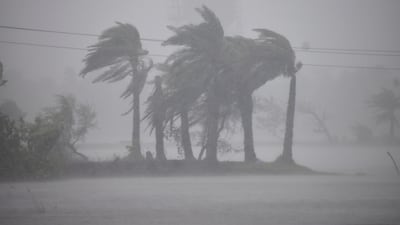At least 15 people have been killed and several are missing after a quarry collapsed in Aizawl in India’s north-eastern Mizoram state on Tuesday.
The accident happened after torrential rain caused by Cyclone Remal.
The severe cyclonic storm made landfall late on Sunday between Sagar Island in the eastern state of West Bengal in India and Khepupara in southern Bangladesh. At least 16 people were killed across both countries.
While the storm subsided into a depression, strong wind and torrential rain hit India’s eastern and north-eastern states flanking the Himalayas.
Heavy rain caused havoc in the remote city of Aizawl and triggered a number of landslides at the quarry between Melthum and Hlimen districts early on Tuesday.
State chief minister Lalduhoma, who uses a single name, confirmed to daily newspapers that at least 15 people were killed and several others were trapped under the debris.
“The storm is subsiding now but the signal is very poor in many parts of the state, making it difficult to gather information and respond,” Mr Lalduhoma said.
Emergency workers have launched a search and rescue operation but heavy rain has hindered their efforts.
“All efforts are under way to rescue the people who are trapped under the debris,” said Anil Shukla, Mizoram’s senior police officer. "However, heavy rains are affecting the operations. The water levels of rivers are also rising and many people living in the riverside areas have been evacuated."
Aizawl has been cut off from the rest of the country after a landslide blocked a motorway that connects the hilly region with mainland India.
Authorities in the state have closed schools and banks, and advised people to stay indoors as heavy rain continues.
The government has allocated 150 million rupees ($1.8 million) for relief work and approved 400,000 rupees as compensation to bereaved families.
The weather has also caused havoc in neighbouring states.
A 17-year-old boy was killed and more than a dozen injured in Assam state after trees fell on them due to strong winds and heavy rain on Tuesday, state chief minister Himanta Biswa Sarma said.
"Power supply is disrupted in lower Assam, including Guwahati. We are monitoring the situation and request everyone to stay indoors until the situation stabilises," Mr Sarma said.

The Indian Meteorological Department has warned of heavy rain and winds of up to 50kph across north-east India on Tuesday and has advised vulnerable people to move to safer locations.
Cyclone Remal moved across the Bay of Bengal late last week, prompting authorities in India and Bangladesh to evacuate low-lying areas, with thousands of people leaving.
Torrential rain flooded homes and farmland, and flattened fragile structures. Trees and electricity poles were uprooted, causing major disruption in West Bengal and coastal parts of Bangladesh.


